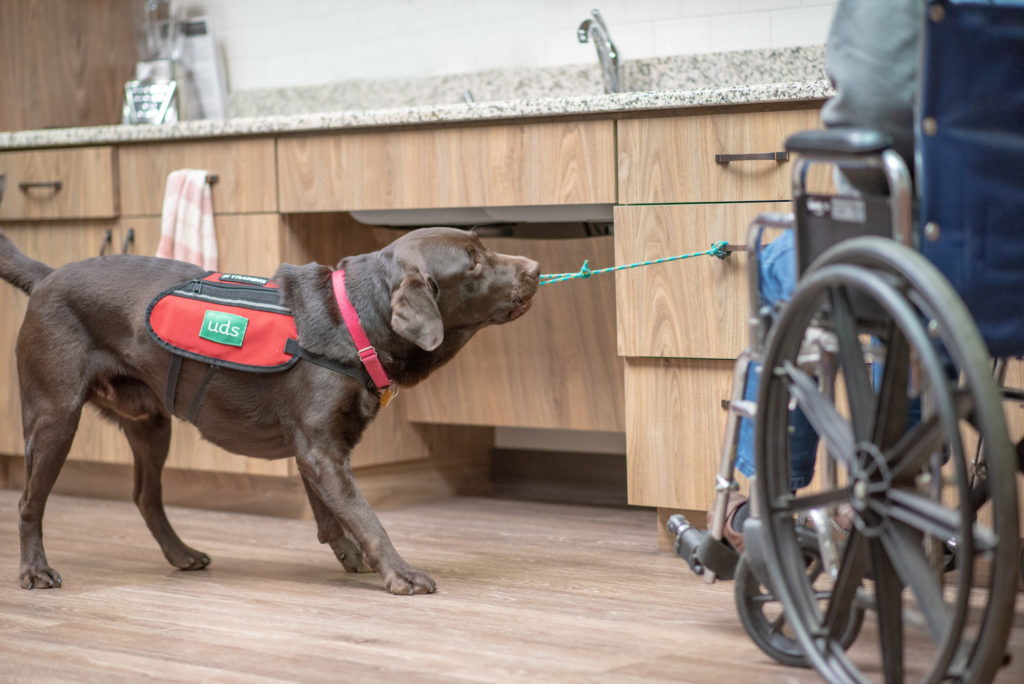
Service dogs have the unique ability to sense medical emergencies before humans even realize something may be wrong. Using specifically trained techniques to recognize changes in smell, body language, heartbeat, and breathing they are able to detect changes in the body that occur during early stages of medical issues. By recognizing these early warning signs, service dogs can alert their handlers and help prevent issues from worsening.
Smell
With 300 million receptors in their nose, dogs have an extremely strong sense of smell and can be trained to detect even the smallest of changes in their person’s companion’s scent. Different chemical changes in the body that can be linked to certain medical issues will produce specific scents to the dog. Service dogs can smell the differences in hormone or metabolic changes through sweat and breath. Low blood sugar, seizures, migraines, anxiety, and PTSD episodes can all be detected using scent. Dogs trained to recognize low blood sugar are able to alert individuals before they get concerningly low. Service dogs can also be trained to assist with seizures. Many are trained to retrieve needed medications in the event of one of these episodes.
Body Language
Dogs are very aware of the body language of the people around them. Body language can be another indicator of medical issues. Dogs are able to familiarize themselves with individuals’ perceived normal movements through bonding time and reinforcing the recognition of patterns in behaviors. Posture changes can be an indicator of an on coming seizure. Changes in facial expressions can also be an indicator of seizures or changes in blood sugar. Not every movement or expression is an indicator of a medical emergency. Dogs will be exposed to laughter, louder voices, stretching, and other movements that could be common in order to make sure they are desensitized to them and don’t misinterpret them.
Hearing Changes in Heartbeat
A change in heartbeat can be a signal of many conditions that dogs can be trained to assist with such as anxiety or panic attacks. Elevated adrenaline levels are known to cause high heart rate. This is seen commonly with veterans that struggle with PTSD and other mental health issues. When dogs are in close proximity to people, they are able to hear changes in vibration and sound, allowing them to be able to hear pulse changes in a person. They can learn to use the sense of hearing as another technique to help recognize medical emergencies in conjunction with their sense of smell and observing movement changes. Once they notice these changes it is important for them to alert their companion. This can be done by them immediately going to retrieve a specific medication, pawing, licking, barking, or leaning on the person. The dog is trained to translate their sense to an intentional action to notify their person.
Changes in Breathing
Rapid, shallow breathing or shortness of breath can reveal many different conditions, as
breathing is linked to the heart, brain, and nervous system. Irregular breathing can be associated with panic or anxiety attacks. Breathing is sometimes the first symptom as it responds instantly to changes in the body. This is why service dogs are often taught how to recognize changes in breathing. They can be trained in different tactics to regulate breathing in order to better assist their companions. Deep pressure is known to calm hyperventilation, so dogs are trained to lay across their person. They can also be taught to lead the person to lie down to help prevent injury if a fainting episode occurs.
How UDS Can Help
UDS partners services dogs with individuals that have mobility issues, autism, or veterans
suffering from PTSD. Specifically, UDS service dogs can be trained to open and close doors, retrieve, deliver, and turn lights on and off. UDS also works with service dogs that are able to assist people in classroom settings. If you are considering a service dog for you or your loved one, UDS does offer service dog demonstrations as well, to help people become more informed with our service dog program. If you are looking for a service dog to assist with specific medical needs, UDS may be able to help you contact organizations or people better equipped to assist you. At UDS, we pride ourselves in being with you every step of the way, and making ourselves available for any questions and guidance. UDS serves most of eastern and central PA. For more information, please contact us and fill out your information to learn more about our services.